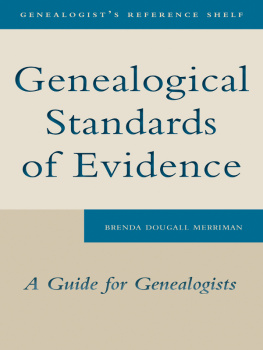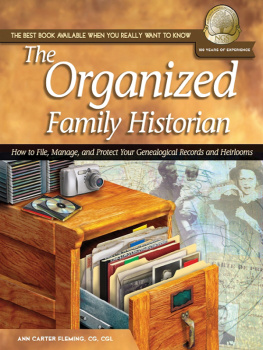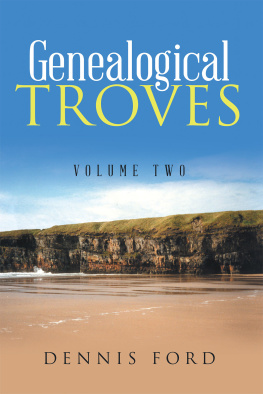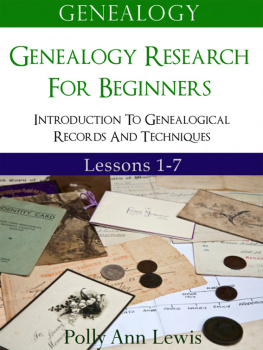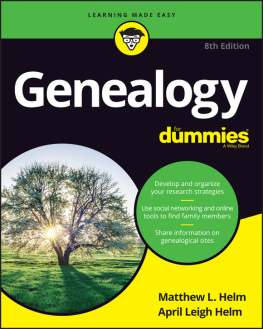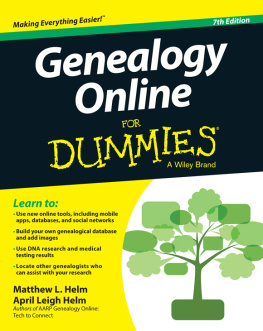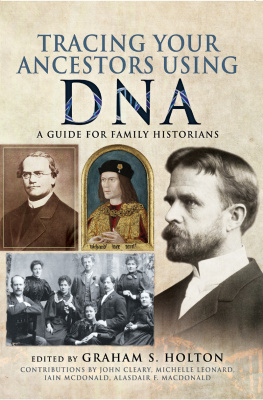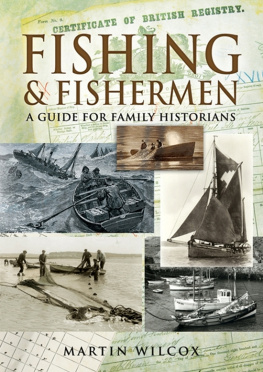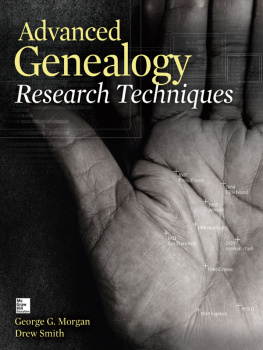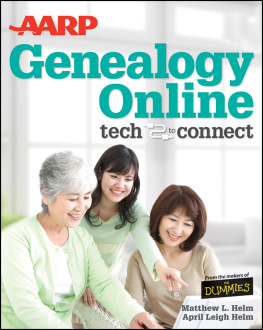
Genealogical
Standards
of Evidence
GENEALOGISTS REFERENCE SHELF
Genealogical
Standards
of Evidence
A Guide for Family Historians
BRENDA DOUGALL MERRIMAN

Copyright Brenda Dougall Merriman, 2010
All rights reserved. No part of this publication may be reproduced, stored in a retrieval system, or transmitted in any form or by any means, electronic, mechanical, photocopying, recording, or otherwise (except for brief passages for purposes of review) without the prior permission of Dundurn Press and the Ontario Genealogical Society. Permission to photocopy should be requested from Access Copyright.
Editor: Ruth Chernia
Design: Courtney Horner
Proofreader: Allison Hirst
Printer:Transcontinental
Library and Archives Canada Cataloguing in Publication
Merriman, Brenda Dougall
Genealogical standards of evidence : a guide for family historians / by Brenda Dougall Merriman.
(Genealogists reference shelf)
Previously published under title: About genealogical standards of evidence.
Includes bibliographical references.
ISBN 978-1-55488-451-3
1. Genealogy. I. Ontario Genealogical Society II.Merriman, Brenda Dougall. About genealogical standards of evidence. III. Title. IV. Series: Genealogists reference shelf
CS88.A1M47 2010 929.1072 C2009-907197-5
1 2 3 4 5 14 13 12 11 10

We acknowledge the support of the Canada Council for the Arts and the Ontario Arts Council for our publishing program. We also acknowledge the financial support of the Government ofCanada through the Book Publishing Industry Development Program and The Associationfor the Export of Canadian Books, and the Government of Ontario through the OntarioBook Publishers Tax Credit program, and the Ontario Media Development Corporation.
Care has been taken to trace the ownership of copyright material used in this book. The author and the publisher welcome any information enabling them to rectify any references or credits in subsequent editions.
J. Kirk Howard, President
Printed and bound in Canada.
www.dundurn.com
Ontario Genealogical Society
Suite 102, 40 Orchard View Boulevard
Toronto, Ontario, Canada M4R 1B9
tel. (416) 489-0734 fax. (416) 489-9803
provoffice@ogs.on.ca www.ogs.on.ca
| Dundurn Press | Gazelle Book Services Limited | Dundurn Press |
| 3 Church Street, Suite 500 | White Cross Mills | 2250 Military Road |
| Toronto, Ontario, Canada | High Town, Lancaster, England | Tonawanda, NY |
| M5E 1M2 | LA1 4XS | U.S.A. 14150 |
CONTENTS
It was my privilege to serve for six years as a trustee on the Board for Certification of Genealogists, during the great period when genealogical principles and standards were being defined on their own terms. In the twenty-first century, genealogy and family history will reach greater heights of recognition and acceptance as an independent field of historical study.
My thanks go to the colleagues who originally encouraged me to develop this manuscript, and to my associates who kindly reviewed it. Special acknowledgement goes to Alison Hare, CG, for being there. Any deviations and errors are solely mine.
Q: Why read this book?
A: It is intended as an introduction to the habits of careful researchers; an inexpensive reference work for checking the research notes you compile; and as a supplement to courses, workshops, or seminars you may have attended.
This book will explain how the genealogical community developed standards of evidence and documentation, what those basic standards are, and how you can apply them to your own work.
This book will not tell you how to find the sources you need for your own research or how to trace your ancestors in detail. You can learn more about family history sources and research techniques from many expertly written manuals and the courses and conferences offered by genealogical societies.
One of the greatest attractions of genealogy and family history is that each of us has a unique nuclear family, shared only by our birth siblings. Thus, discovering our family history begins as an absorbing personal pastime to find the parents of our parents and so on. Soon, however, it will begin to overlap with cousins and descendants of earlier generations as we meet them. Some of them will be researchers, too. Genealogists also frequently share such common connections as ethnic origins or migration patterns. Few other hobbies or professions provide such enjoyment in the hunt, the thrill of discovery, the satisfaction of solving problems.
You might ask, what is the difference between a genealogist and a family historian? Essentially, they have become the same (the terms are used interchangeably in this book). In the past, genealogists tended to compile rather dry tomes of multigenerational names and vital statistics; family historians often produced a labour of love with little reference to solid sources of information. Traditionally, the genealogist followed more or less acceptable formats and a family historian used a more fluid style of presentation. Now most of us aim for the same goal: a well-documented narrative that tells the story of ancestors, not merely a tree with bare names and dates. Family tree seems to be a rather generic term these days for almost any family history project, whereas more properly it refers to a chart or diagram of names and relationships.
Genealogical evidence is the information evaluated and analyzed that allows us to identify an individual, an event in his or her life, or the relationship between individuals. Genealogy and family history revolve around issues of identification. In describing how we establish or argue an identification, we use such words as evidence or proof or source documentation.
By its very nature, the construction of a genealogy requires evidence or proof for the linking of generations. If your cousin insists that your family is descended from William the Conqueror or Louis Riel or the Mayflower passengers, what does he use to substantiate this claim? His grandmother told him, so it must be true (Grandma was the soul of honesty)? He saw it in a book (title and author long forgotten)? He picked it up from that website with the smileys on it? With computers now a fairly staple household fixture, the Internet brings us its dazzling assortment of information. We dont necessarily discount the value of family hearsay or the convenience of compiled databases, but they dont replace tried-and-true methodology for documenting each step of good research.
Later in this book, you will see examples of sources that illustrate some of the research issues to watch for and evaluate. For instance, deaths often produce a wider sampling of record sources than any other major event in the family cycle. There may be variations in the information they contain about one individual. A family history is not complete without a discussion of such anomalies, requiring analytic skills.
Sharing, Preserving, Networking
Next page
